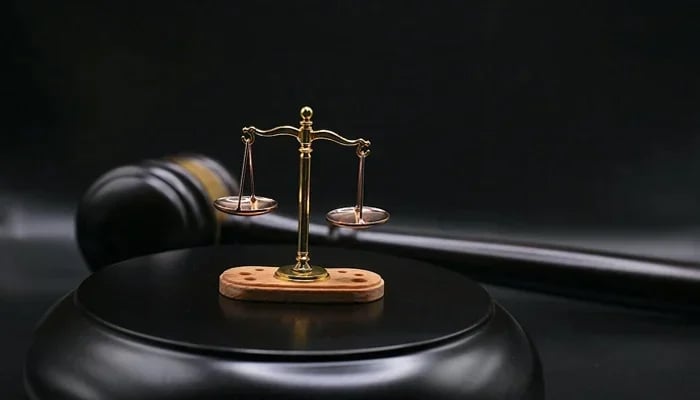Comment: Trials in absentia?
The primary justification for ‘trial by absentia’ lies in the preservation of judicial efficiency
ISLAMABAD: Trial in absentia is a “criminal proceeding in a court of law in which the person who is subject to it is not physically present at those proceedings”.
Here’s a partial list of countries where trials in absentia have been reported or are known to have taken place: United States, United Kingdom, France, Italy, Germany, Russia, China, Iran, Turkey, Saudi Arabia, Egypt, Iraq, India, Israel, Syria, Lebanon, Jordan, Bahrain, United Arab Emirates, Qatar, Kuwait, Oman, Yemen, Sudan, Libya, Algeria, Tunisia, Morocco, South Africa, Nigeria, Kenya, Ethiopia, Brazil Mexico, Colombia, Argentina, Chile and Peru.
The primary justification for ‘trial by absentia’ lies in the preservation of judicial efficiency. In cases where a defendant is either unwilling or unable to appear in court, proceeding with the trial serves to avert unnecessary delays.
Permitting the accused to impede the administration of justice by abstaining from the trial is untenable. In certain cases, such as those involving national security or severe public interest, conducting a trial in absentia may be considered necessary. Waiting for a defendant’s presence may pose risks or hinder the timely administration of justice, justifying the need to proceed with the trial without the physical presence of the accused.
In the United States, the Uniform Code of Military Justice (UCMJ) governs the military legal system and addresses trial in absentia in Article 47. Specifically, the rule pertaining to trial in absentia in the U.S. military is outlined in RCM 804(b). In the legal precedent set by Diaz v. United States, the U.S. Supreme Court emphasized that the Constitution “does not guarantee an accused person immunity from the legitimate consequences of their own wrongful acts.” In the case of Taylor v. United States, the accused underwent a trial and was subsequently convicted in absentia. Furthermore, in United States v. Tortora, the Second Circuit Court of Appeals determined that the trial could proceed even in the absence of the accused.
In Italy trials in absentia ‘are a regular occurrence’. In Italy, military justice is governed by the Military Penal Code (Codice Penale Militare di Guerra). Article 495 of the Military Penal Code allows for the possibility of a trial in absentia. In the 80s, Tommaso Buscetta, Italian mobster, was tried in absentia. Muammar Gaddafi was tried in absentia.
Pol Pot, the leader of the Khmer Rouge regime in Cambodia, was tried in absentia. Slobodan Miloševi, former President of Serbia and Yugoslavia was convicted in absentia (he passed away before the trial was concluded). In 1961, Adolf Eichmann was tried and convicted in absentia by an Israeli court.
Augusto Pinochet, former president of Chile, was tried in absentia. Radovan Karadži, Bosnian Serb politician, was tried in absentia. Jean-Claude Duvalier, former president of Haiti, was tried in absentia. Meng Hongwei, former president of Interpol, was tried for corruption in absentia in China. Ferdinand Marcos was tried in absentia. In conclusion, the practice of trials in absentia is a globally applied legal phenomenon. It aims to maintain judicial efficiency and address cases of national security. The varied instances, from the US military to international figures, underscore the diverse contexts in which this legal approach is employed.
-
 Iran Tensions Rise As Trump Says He Is 'not Thrilled' With Nuclear Negotiations
Iran Tensions Rise As Trump Says He Is 'not Thrilled' With Nuclear Negotiations -
 Where Is Calvin Klein's Wife Kelly Klein Now After Divorce And Fashion Fame?
Where Is Calvin Klein's Wife Kelly Klein Now After Divorce And Fashion Fame? -
 Kourtney Kardashian’s Role As Stepmother Questioned
Kourtney Kardashian’s Role As Stepmother Questioned -
 Neil Sedaka Dies At 86 After Hospitalisation In Los Angeles
Neil Sedaka Dies At 86 After Hospitalisation In Los Angeles -
 'Lizzie McGuire' Star Robert Carradine's Reason Of Death Laid Bare
'Lizzie McGuire' Star Robert Carradine's Reason Of Death Laid Bare -
 Lisa Rinna Breaks Silence After Recent Reunion With Andy Cohen: 'I've Pissed Him Off'
Lisa Rinna Breaks Silence After Recent Reunion With Andy Cohen: 'I've Pissed Him Off' -
 Savannah Guthrie Mom Update: Unexpected Visitors Spark Mystery Outside Nancy's Home
Savannah Guthrie Mom Update: Unexpected Visitors Spark Mystery Outside Nancy's Home -
 Elle Fanning Shares Detail About Upcoming Oscars Night Plan With Surprise Date
Elle Fanning Shares Detail About Upcoming Oscars Night Plan With Surprise Date -
 Demi Lovato Spills Go-to Trick To Beat Social Anxiety At Parties
Demi Lovato Spills Go-to Trick To Beat Social Anxiety At Parties -
 Benny Blanco Looks Back At The Time Selena Gomez Lost Her Handrwritten Vows Days Before Wedding
Benny Blanco Looks Back At The Time Selena Gomez Lost Her Handrwritten Vows Days Before Wedding -
 Naomi Watts Reveals Why She Won't Get A Facelift In Her 50s
Naomi Watts Reveals Why She Won't Get A Facelift In Her 50s -
 Travis Kelce's Mom Donna Fires Back At Critic With Sarcastic Reply After Body Jab
Travis Kelce's Mom Donna Fires Back At Critic With Sarcastic Reply After Body Jab -
 Kendall Jenner Gets Candid About Her Differences With The Kardashian Clan Over Style Choices
Kendall Jenner Gets Candid About Her Differences With The Kardashian Clan Over Style Choices -
 Sam Altman Opens Up About OpenAI, Anthropic, Pentagon Conflict
Sam Altman Opens Up About OpenAI, Anthropic, Pentagon Conflict -
 Brenda Song Confesses Fascination With Conspiracy Theories
Brenda Song Confesses Fascination With Conspiracy Theories -
 Lunar Eclipse 2026: Time, Date, Sighting Locations, Know Every Detail
Lunar Eclipse 2026: Time, Date, Sighting Locations, Know Every Detail




